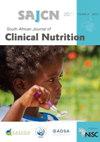Dietary intake of first- and third-year female dietetics students at a South African university
IF 0.8
Q4 NUTRITION & DIETETICS
引用次数: 2
Abstract
Objective: A survey was undertaken to evaluate and compare dietary intakes of first- and third-year female dietetics students. Design: This was a cross-sectional survey. Setting: The University of Pretoria (UP) was the site of the survey. Population: The study encompassed first- (2012–2015) and third- (2012–2017) year female dietetics students (N = 368). Outcome: Dietary intake data from multiple-day weighed food records were analysed on nutrient, food group and meal and snacking pattern levels. Results: Recorded energy intakes of participants (n = 105 first years, n = 166 third years; response rate: 73.6%) were below Estimated Energy Requirements. Across year groups, intakes exceeded and fell below the Acceptable Macronutrient Distribution Range for fat and carbohydrates respectively; however, third years consumed cereals, grains and starchy vegetables more often. Over 50% of first and third years exceeded Estimated Average Requirements of respectively 3 and 6 of 10 tested micronutrients. Third years recorded higher (all p < 0.001) intakes of protein, magnesium, calcium, zinc and vitamin A than first years. Similarly, their Nutrient Adequacy Ratios were higher (all p < 0.001) for magnesium, calcium and vitamins A, B6 and B12. Average Mean Adequacy Ratios were 70% (first years) and 77% (third years). The year groups differed in terms of food group intake. The number of daily eating occasions decreased over weekends for first and third year students, yet intakes of energy (p < 0.05) and fat (p < 0.001) were higher over weekends. Conclusions: Amidst likely under-recording and/or under-eating, UP female dietetics students’ intakes of some micronutrients may be low. Recorded intakes of third years exceeded those of first years. Recorded nutrient intake improved from the first to the third year of the study in dietetics students.南非一所大学一年级和三年级女营养学学生的膳食摄入量
目的:对一年级和三年级女生的膳食摄入量进行评估和比较。设计:这是一项横断面调查。背景:比勒陀利亚大学(UP)是此次调查的地点。人群:该研究涵盖了一年级(2012-2015)和三年级(2012-2017)的女性营养学学生(N = 368)。结果:对来自多日称重食物记录的饮食摄入量数据进行了营养素、食物组、膳食和零食模式水平分析。结果:记录的参与者能量摄入(n = 105第一年,n = 166第三年;应答率:73.6%)低于估计的能量需求。在各年龄组中,脂肪和碳水化合物的摄入量分别超过和低于可接受的大量营养素分布范围;然而,第三年更经常食用谷物、谷物和淀粉类蔬菜。超过50%的第一年和第三年分别超过了10种测试微量营养素中3种和6种的估计平均需求量。第三年记录更高(所有p < 0.001)蛋白质、镁、钙、锌和维生素A的摄入量。同样,他们的营养充足率也更高(所有p < 0.001)的镁、钙和维生素A、B6和B12。平均充足率为70%(第一年)和77%(第三年)。年份组在食物组摄入量方面存在差异。一年级和三年级学生的日常用餐次数在周末有所减少,但能量摄入(p < 0.05)和脂肪(p < 0.001)在周末更高。结论:在可能记录不足和/或饮食不足的情况下,UP女性营养学学生的某些微量营养素摄入量可能较低。第三年的录取人数超过了第一年。从研究的第一年到第三年,记录在案的营养学学生的营养摄入有所改善。
本文章由计算机程序翻译,如有差异,请以英文原文为准。
求助全文
约1分钟内获得全文
求助全文
来源期刊

South African Journal of Clinical Nutrition
NUTRITION & DIETETICS-
CiteScore
2.50
自引率
9.10%
发文量
21
期刊介绍:
1.The Journal accepts articles from all basic and applied areas of dietetics and human nutrition, including clinical nutrition, community nutrition, food science, food policy, food service management, nutrition policy and public health nutrition. 2.The Journal has a broad interpretation of the field of nutrition and recognizes that there are many factors that determine nutritional status and that need to be the subject of scientific investigation and reported in the Journal. 3.The Journal seeks to serve a broad readership and to provide information that will be useful to the scientific community, the academic community, government and non-government stakeholders in the nutrition field, policy makers and industry.
 求助内容:
求助内容: 应助结果提醒方式:
应助结果提醒方式:


